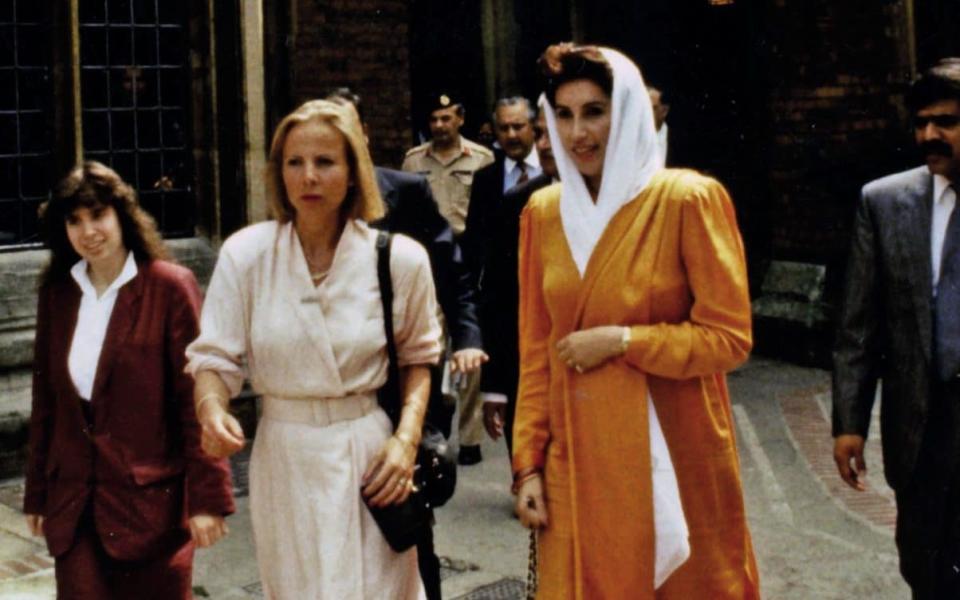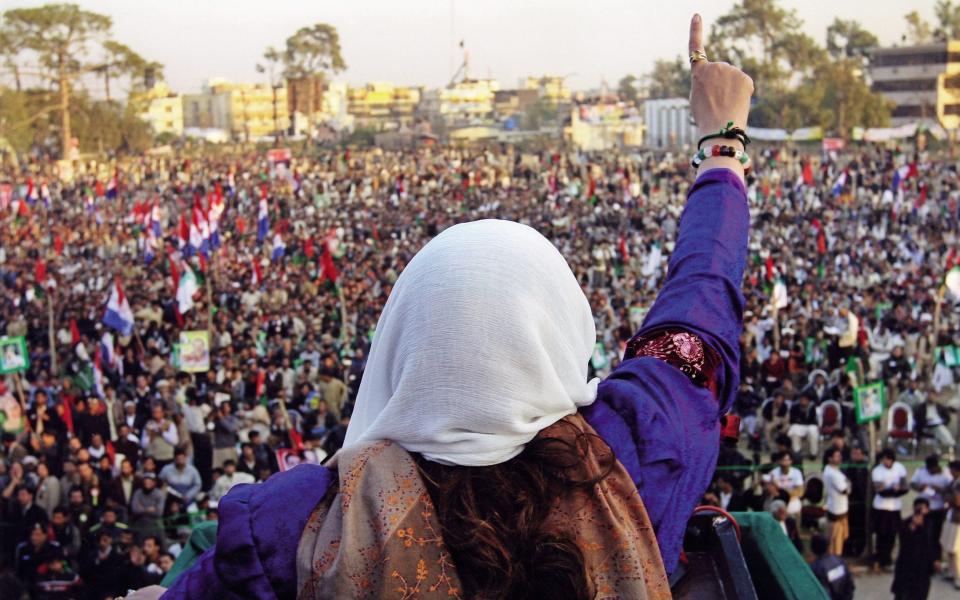‘From Oxford pals to political prisoner – my 30-year friendship with Benazir Bhutto’

“Do you know the Prime Minister of Pakistan’s daughter is in your college?” one of my parents’ friends asked me shortly before I went up to Oxford to read Modern History in 1974.
“Oh really?” I responded, trying to put some expression into my blank face to be spared the embarrassment of admitting I had no idea who the Prime Minister of Pakistan was, nor his daughter.
But it didn’t take long to find out.
Soon after arriving in Oxford, I went to join the Union, with its busts of past prime ministers and debating tradition modelled on the House of Commons. In the crowd I saw a tall woman with long dark hair, wearing a sweatshirt and jeans.
“Hello”, the person beside her was saying to me, “I think you said you were at Lady Margaret Hall? You must meet Benazir Bhutto; you know, she’s at LMH, too.”
Little could I have realised that I had just met the person whose fortunes for the next three decades, as a political activist, prisoner and twice prime minister of Pakistan, I would follow both as a close friend and as a journalist and historian. Nor could I envisage how challenging this seemingly carefree woman’s life would become.
In the sociable environment of Oxford, she cut a swathe among the other students; her charisma, kindness and sense of fun making her instantly likeable. Benazir and I may have been in the same college but it was in the Union that our friendship was forged. In the late Seventies, women were still a rarity. That Benazir became the third female president, and I succeeded her as the fourth, created a special bond between us. As our friendship grew, I began to understand more about Pakistan and readily accepted an invitation to visit her at her home, in Karachi, after we’d graduated in the summer of 1977.
But within days of her return to her home country, her father, Zulfikar Ali Bhutto, prime minister since 1973, was overthrown in a military coup following allegations of rigged elections.
And so I postponed my trip. Instead of rescheduling the election, Pakistan’s new ruler, General Mohammed Zia-ul-Haq, instigated a process of accountability. To my amazement, Benazir’s father was put on trial for conspiracy to murder a political opponent. Overnight, with all her father’s colleagues arrested, Benazir became the party’s spokeswoman, memorably stating years later: “I didn’t choose this life, it chose me.”
After her father was sentenced to death in March 1978, I received the letter which changed my life.
“I don’t even know what your parents would think of your visiting a country ruled by bayonets in the heat of the summer. However if, in these circumstances, you are able to come, please do.” She ended with a PS: “Flogging and hanging are the rule of the day. Jails are jam-packed with political prisoners. People have been terrorised into silence. It does not seem like a state in the 20th century. Islam, a merciful religion, is wrongly invoked for acts of brutality.”
I managed to get myself accredited as a journalist with the Spectator, so that I could attend her father’s appeal, in the Supreme Court of Pakistan. There were no mobile phones, no email, not even fax machines. My accoutrements were a notebook and an instamatic camera.

It was a harrowing year; Benazir was in and out of house arrest, her vivid description in an interview I later recorded with her, capturing the sense of isolation: “It was a situation where one was living and yet one was not living. It was as if I did not exist, I did not have a voice, I could not communicate, I could not inter-relate. It was like being paralysed.”
In September, during a rare period of freedom shortly before General Zia made himself president, I travelled with Benazir on her first political tour of the Khyber-Pakhtunkhwa province (the former North-West Frontier Province). “They call her ‘daughter of the people’ and ‘daughter of Pakistan’,” I told my parents, marvelling at my friend’s transformation from Oxford Union debater to forceful politician, aged just 25.
But her campaigning could not save her father. In early 1979, his death sentence was upheld. Countless mercy petitions were sent by governments around the world; the British entreaty was delivered by then foreign secretary, the Rt Hon Dr David Owen, who warned that “grass grows swiftly over a battlefield, but never over a scaffold”.
On April 4 1979, Zulfikar Ali Bhutto was hanged. Heartbroken at what she described as his “judicial murder”, together with her mother, Nusrat, Benazir formally adopted his political mantle.
By this time I was back in England, no longer the naïve western woman who had first travelled to Pakistan but a commentator on the region and author of Bhutto: Trial and Execution.
I did not see Benazir again for nearly five years until, finally, after international pressure, she was released from house arrest and allowed to leave Pakistan for medical treatment in the UK.
Thousands of supporters came to the airport to meet her, as did I. “Jeaay Bhutto, Jeeay Benazir! Long live Bhutto, Long live Benazir!” the crowd shouted enthusiastically, hemmed in by the arrivals’ barrier. I wondered if, as she emerged, she would see me amid the throng. Amazingly she did. “Hi, Vicks,” she said with a smile, before she was swept forward to give an impromptu press conference.
Still charismatic, she now demonstrated the steely courage that lasted a lifetime, during which she experienced great triumphs: her election, aged 35, as the youngest female prime minister of a Muslim nation following Zia’s death in a plane crash in 1988; and a second term of office in 1993. There were also tragedies: the mysterious death of her younger brother, Shahnawaz, in the south of France in 1985 (the family believes he was poisoned) and of her other brother, Murtaza, in a police shootout in Karachi in 1996.
Through it all, Benazir and I never lost touch, our correspondence continuing with letters, fax and then emails. I returned frequently to Pakistan, firstly, for her marriage to Asif Ali Zardari in 1987, and then to research a new book.
Both as prime minister and leader of the opposition, Benazir always received me warmly. We also met on her visits to London, our friendship passed to the next generation as her children and mine became friends.

A highlight was organising reunions with her Oxford friends. Despite her celebrity status and the passage of time, she always wanted to know who had married whom so she could be sure to send a wedding gift . Memorably, when I was expecting my first child she turned up with three baby outfits.
But her life in politics took a heavy toll, her carefree nature burdened with responsibility. Allegations of corruption meant that, in 1999, Benazir went into self-imposed exile, living first in London and then in Dubai. Her political comeback was to have been in 2007 to take part in the election campaign to oust another self-appointed military ruler, General Pervez Musharraf. In October, I and a plane-load of family, journalists and well-wishers accompanied her.
On the evening of her arrival, as she progressed triumphantly through the streets of Karachi, her truck was targeted by suicide bombers, two explosions in quick succession showering our open top truck with debris and flesh.
Miraculously, terrifying as the experience was, we all survived, including Benazir had been down below working on her speech. “I am so relieved you are safe,” she said to me, when we met again at her home, our rapid evacuation from the truck separating everyone in the confusion which followed. But over 150 in the streets nearby were killed and, perhaps for the first time, I realised how real were the dangers which lay ahead.
On December 27 2007, Benazir was assassinated. Her death left the most terrible void, not just for me personally, but, above all, for her family and her millions of supporters, who would never know what she, in her prime, could have achieved. As I watched images on television of her simple wooden coffin leaving the hospital, where she had been pronounced dead, her name and the dates “1953-2007” flashing across the television screen, I could not believe that was the sum total of my friend’s life.
The Fragrance of Tears: My friendship with Benazir Bhutto by Victoria Schofield (published by Head of Zeus): Buy now for £25 at books.telegraph.co.uk or call 0844 871 1514

 Yahoo News
Yahoo News 